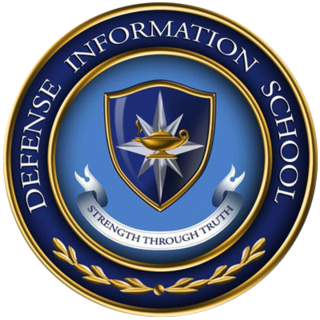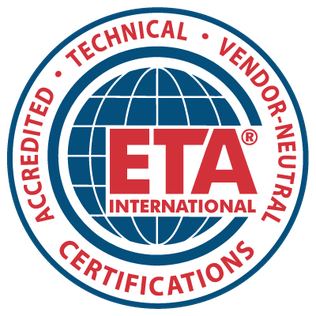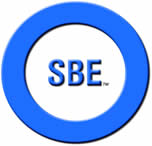Broadcast engineering or radio engineering is the field of electrical engineering, and now to some extent computer engineering and information technology, which deals with radio and television broadcasting. Audio engineering and RF engineering are also essential parts of broadcast engineering, being their own subsets of electrical engineering.
The Sydney Accord is an international mutual recognition agreement for qualifications in the fields of engineering technology.

The Defense Information School (DINFOS) is a United States Department of Defense (DoD) school located at Fort George G. Meade, Maryland. DINFOS fulfills the Department of Defense's need for an internal corps of professional journalists, broadcasters, and public affairs professionals. Members from all branches of the U.S. military, DoD civilians and international military personnel attend DINFOS for training in public affairs, print journalism, photojournalism, photography, television and radio broadcasting, lithography, equipment maintenance and various forms of multimedia. The American Council on Education recommends college credit for most DINFOS courses.

The Electronics Technicians Association, International, Inc. is a US-based not-for-profit 501(c)(6) trade association founded in 1978. The association provides certifications in industries such as basic electronics, fiber optics and data cabling, renewable energy, information technology, photonics and precision optics, customer service, biomedical, avionics, wireless communications, radar, and smart home. ETA is also one of the 12 COLEMs for U.S. Federal Communications Commission (FCC) testing. ETA works with technicians, educators, and military personnel. ETA also partners with companies such as Motorola Solutions to provide certification to their employees.
The National Institute for Certification in Engineering Technologies (NICET) is an organization that was established in 1961 to create a recognized certification for engineering technicians and technologists within the United States. A 1981 study by the National Cooperative Highway Research Program (NCHRP), requested by the American Association of State Highway and Transportation Officials' SubCommittee On Construction (AASHTO SCOC), prompted the National Society of Professional Engineers (NSPE) to merge two certification bodies; the Institute for the Certification of Engineering Technicians (ICET) and the Engineering Technologist Certification Institute. The result is a nonprofit organization that provides a nationally recognized and accepted procedure for recognition of qualified engineering technicians and technologists.

RCC Institute of Technology(RCC) was founded as the Radio College of Canada in 1928, making it one of the oldest private technology institutions in Canada. It is also the only private educational institute in Ontario to be approved by the Ministry of Training, Colleges and Universities to grant bachelor's degrees. In 2018, Yorkville University acquired RCC Institute of Technology. It was amalgamated with Yorkville to become Yorkville University/Ontario.

An operator is a professional designation used in various industries, including broadcasting, computing, power generation and transmission, customer service, physics, and construction. Operators are day-to-day end users of systems, that may or may not be mission-critical, but are typically managed and maintained by technicians or engineers. They might also work on a 24-hour rotating shift schedule.
Certified broadcast radio engineer (CBRE) is a title granted to an individual in the United States who successfully meets the experience and test requirements of the certification, regulated by the Society of Broadcast Engineers (SBE). The CBRE title is protected by copyright laws. Individuals who use this title without consent from the Society of Broadcast Engineers could face legal action.
Certified Radio Operator (CRO) is a title granted to an individual in the United States who passes the examination requirements of the certification. The certification is regulated by the Society of Broadcast Engineers. The CRO title is protected by copyright laws.
Certified television operator (CTO) is a title granted to an individual that successfully passes the examination requirements of the certification in the United States. The certification is regulated by the Society of Broadcast Engineers (SBE). The certification title is protected by copyright laws. Individuals who use the title without consent from the Society of Broadcast Engineers could face legal action.
Certified Broadcast Technologist (CBT) is a title granted to an individual that successfully meets the experience or examination requirements of the certification. The certification is regulated by the Society of Broadcast Engineers (SBE). The CBT title is protected by copyright laws. Individuals who use the title without consent from the Society of Broadcast Engineers could face legal action.
Certified Broadcast Networking Technologist (CBNT) is a title granted to an individual that passes the exam requirements of the certification. The certification is regulated by the Society of Broadcast Engineers (SBE) and shows competence in computer network equipment and their specialized applications. The CBNT title is protected by copyright laws. Individuals who use the title without consent from the Society of Broadcast Engineers could face legal action.
Certified Broadcast Television Engineer (CBTE) is a title granted to an individual who successfully meets the experience and examination requirements of the certification. The certification is regulated by the Society of Broadcast Engineers (SBE). The CBTE title is protected by copyright laws. Individuals who use the title without consent from the Society of Broadcast Engineers could face legal action.
Certified Senior Broadcast Radio Engineer (CSRE) is a title granted to an individual in the United States who successfully meets the experience and examination requirements of the certification. The certification is regulated by the Society of Broadcast Engineers (SBE). The CSRE title is protected by copyright laws. Individuals who use the title without consent from the Society of Broadcast Engineers could face legal action.
Certified Senior Broadcast Television Engineer (CSTE) is a title granted to an individual that successfully meets the experience and examination requirements of the certification. The certification is regulated by the Society of Broadcast Engineers (SBE). The CSTE title is protected by copyright laws. Individuals who use the title without consent from the Society of Broadcast Engineers could face legal action.
Certified Professional Broadcast Engineer (CPBE) is a title granted to an individual who already holds an SBE Senior Broadcast Engineer certification or registered as a professional electrical engineer and also successfully meets the experience and reference requirements of the certification. The certification is regulated by the Society of Broadcast Engineers (SBE). The CPBE title is protected by copyright laws. Individuals who use the title without consent from the Society of Broadcast Engineers could face legal action.
Certified AM Directional Specialist (AMD) is a specialist title granted to an individual that successfully meets the prerequisite certification and examination requirements. The certification is regulated by the Society of Broadcast Engineers (SBE), and demonstrates competence in the design and maintenance of AM Directional antenna facilities. The "Certified AM Directional Specialist" title is protected by copyright laws. Individuals who use the title without consent from the Society of Broadcast Engineers could face legal action.
Certified 8-VSB Specialist (8-VSB) is a specialist title granted to an individual that successfully meets the prerequisite certification and examination requirements in the United States. The certification is regulated by the Society of Broadcast Engineers (SBE), and demonstrates competence in the various aspects of 8-VSB (ATSC) digital television facilities. The "Certified 8-VSB Specialist" title is protected by copyright laws. Individuals who use the title without consent from the Society of Broadcast Engineers could face legal action.
Certified Digital Radio Broadcast Specialist (DRB) is a specialized title granted in the United States to a previously SBE-certified individual who successfully meets the examination requirements. The certification is regulated by the Society of Broadcast Engineers (SBE), and demonstrates competence in the design and maintenance of digital radio broadcast facilities. The "Certified Digital Radio Broadcast Specialist" title is protected by copyright laws. Individuals who use the title without consent from the Society of Broadcast Engineers could face legal action.
Certified Broadcast Networking Engineer (CBNE) is a title granted to an individual that passes the exam requirements of the certification. The certification is regulated by the Society of Broadcast Engineers (SBE) and shows competence in computer network equipment and their specialized applications in radio and television broadcast stations. The CBNE title is protected by copyright laws. Individuals who use the title without consent from the Society of Broadcast Engineers could face legal action.




